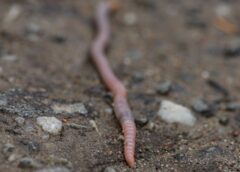Newswise — Earthworms are a welcome sight for gardeners and farmers because the wriggling invertebrates recycle nutrients from soil, making them more accessible to plants. As worms burrow, they consume almost everything in their path, including microscopic plastic pollution. Now, researchers reporting in ACS’ Environmental Science & Technology have observed that earthworms actually prefer soil with some types of microplastics but digest the polymers differently, which the team suggests could impact the animals’ health and the ecosystem.
Soil is becoming increasingly contaminated by fragments of plastic – especially microplastics less than 5 mm wide – that have broken off of larger plastic waste or have been directly released from products as small particles. Previously, researchers have shown that earthworms will ingest these synthetic particles, even breaking them apart into smaller pieces. But during the digestion process, animals could potentially be harmed by the microplastics themselves or by the toxic substances they carry. Currently, companies are producing alternatives to petroleum-based plastics that are derived from plants, are biodegradable or both. Just like traditional plastics, these “bioplastics” can also fragment into microscopic particles, but there is limited information on whether earthworms will also ingest and decompose these materials. So, Lei Wang and colleagues wanted to compare the willingness of earthworms to consume soil laced with microscopic pieces of bioplastic and petroleum-derived plastic, studying the in vitro digestion and excretion of the particles.
By placing earthworms in chambers with different types of plastics in certain locations in the soil, the researchers found that worms preferred soils with bio-based polylactic acid (PLA) particles or petroleum-derived polyethylene terephthalate (PET) particles but actively avoided some semi-synthetic plastics. When lactic acid and terephthalic acid, sour-smelling monomers that make up PLA and PET, respectively, were spiked into soil, the worms were also attracted, suggesting that the animals were drawn in by the odors as potential cues for food. In another experiment, the researchers put earthworms in soil mixed with either microscopic PLA or PET particles. Analysis of the creatures’ excretions showed that their digestive systems broke down PLA into much smaller fragments than was observed with PET plastics. The animals also excreted PLA much more slowly. The researchers say the results show that earthworms can promote the breakdown of bioplastics, such as PLA, in soil. They add that more studies are needed to determine how the slow excretion of PLA fragments affects the health of these animals and whether the worms are an option to remove degradable plastics from the environment.
The authors acknowledge funding from a National Key Research and Development Project of China, the National Natural Science Foundation of China, the Tianjin Municipal Science and Technology Bureau, the Ministry of Education (China) and the Tianjin Research Innovation Project for Postgraduate Students.
The paper’s abstract will be available on April 6 at 8 a.m. Eastern time here: pubs.acs.org/doi/abs/10.1021/acs.est.1c08066.
The American Chemical Society (ACS) is a nonprofit organization chartered by the U.S. Congress. ACS’ mission is to advance the broader chemistry enterprise and its practitioners for the benefit of Earth and all its people. The Society is a global leader in promoting excellence in science education and providing access to chemistry-related information and research through its multiple research solutions, peer-reviewed journals, scientific conferences, eBooks and weekly news periodical Chemical & Engineering News. ACS journals are among the most cited, most trusted and most read within the scientific literature; however, ACS itself does not conduct chemical research. As a leader in scientific information solutions, its CAS division partners with global innovators to accelerate breakthroughs by curating, connecting and analyzing the world’s scientific knowledge. ACS’ main offices are in Washington, D.C., and Columbus, Ohio.
To automatically receive news releases from the American Chemical Society, contact [email protected].
Follow us: Twitter | Facebook | LinkedIn | Instagram

Rod Washington: Rod is a blogger, writer, filmmaker, photographer, daydreamer who likes to cook. Rod produces and directs the web series, CUPIC: Diary of an Investigator. He also produces news and documentary video projects. Check out his podcast StoriesThisMoment at https://m3e.d71.myftpupload.com/stm-tncn-podcasts/


